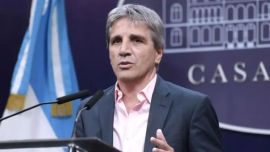To nobody’s surprise but their own, the Kirchnerites – who live in an alternative universe – have proved unable to handle the economy with a minimum of common sense. It is not that they have lost the plot. Instead, they cling desperately to the one they and their predecessors invented over half a century ago when already antiquated revolutionary notions were in vogue among university students and would-be intellectuals. Since then, survivors of the dirty war they started and their offspring, whether biological or ideological, have spent most of their waking hours trying to make out that back then they were right and everyone else was wrong.
They are still at it. As far as Alberto Fernández, Cristina Fernández de Kirchner and all the rest of them are concerned, Argentina’s unhappy condition is entirely the fault of that malignant genius Mauricio Macri who has been helped by the Supreme Court justices, a traitorous business establishment, foreign imperialists, wicked landowners and, now, by more than 40 million dollar-worshippers who keep spurring on inflation because they are mentally programmed to do so.
A few days ago, Alberto told the world that the cost of living rises far faster here than elsewhere because deep down people prefer it that way. Perhaps it occurred to him that, since Argentina has long been a Freudian stronghold in which psychoanalysts are as thick on the ground as lawyers, his explanation would be widely accepted. If so, he was mistaken. His attempt to convince people that inflation is a symptom of a strange mental disease which afflicts most of his compatriots has not gone down very well because, while most people are well aware that expectations do influence what happens in the marketplace, they also know that by churning out huge amounts of unbacked banknotes, boosting state expenditure and letting the reserves dwindle to vanishing-point, the government is ensuring that prices will continue to skyrocket. To bring things under control, Alberto’s government would have to slow down the printing-presses and greatly reduce public spending, measures that, needless to say, it refuses to contemplate for what, let’s face it, are sound political reasons.
Cristina and other Kirchnerites – apart from Alberto, who says he would get re-elected by a grateful populace if it finally realised that he is a marvellous president – have reportedly come to the conclusion they will lose this battle in the holy war they are gallantly waging against an imposing array of evildoers, but are convinced that, after regrouping in the Buenos Aires Province slum belt, they will manage to mount a successful counter-attack. Unfortunately for much of the population, to improve their chances they are trying to make sure that the economic crisis they are stoking boils over soon after they have been removed from office and, presumably, the hated Macriites, some shilly-shallying Radical or even the nutty libertarian Javier Milei is in charge.
Such an approach has its logic. Thanks to the fixed-term presidential system imported from the United States, the Kirchnerites have to be allowed to continue ruling the country for almost another 11 months. From their point of view, it would be politically suicidal for them to spend the available time making a serious attempt to put the economy back on track so, as they have no desire to make life easier for whoever comes next, they can be relied upon to hold down utility rates to make consumers think energy should cost far less here than in neighbouring countries and, among other things, greatly increase the number of drones who are on the public-sector payroll or draw benefits without asking themselves where the money to pay them will come from.
What is their priority? Now that dreams of turning Argentina into a revolutionary bastion seem to have faded, most Kirchnerites are either at a loss or limit themselves to feathering their own nests. This has made it easier for Cristina to persuade her followers that they should devote themselves full-time to defending her against the many who would think she should spend the rest of her life behind bars. Always willing to oblige, the constantly henpecked president is trying to help her by attacking the Judiciary, much of the media and opposition politicians even though he must be well aware that by behaving in this manner he is making his own job far harder and that, after leaving office, he will be despised by most Argentines, including many Peronists, as a slavish weakling who made a mess of the presidency he was gifted.
Is Kirchnerism a progressive, left-wing phenomenon? Its leaders desperately want people to think so, which is why Alberto goes on about the risks posed by “recalcitrant right-wingers and Fascists” who are allegedly waiting to pounce and feed on what is left of the country. By old-fashioned standards, at least those upheld by European social democrats of former days, Macri’s government was more leftist than those of Néstor Kirchner and his spouse, but nonetheless the couple succeeded in convincing much of the world that they represented a Latin American variant of the progressive cause and, what is more, were world-leaders when it came to the defence of human rights.
After a few months in office, Néstor was disarmingly frank when asked why he – a born autocrat who, before moving into the Pink House, had run his native fiefdom in a notably right-wing manner – wanted people to think he was a leftist; he pointed out that it would ensure him the support of many who may be described as “cultural progressives” and are fairly influential both here and in many other parts of the world.
Such people are a gullible lot; until fairly recent, even despicable and astoundingly incompetent tyrants like Venezuela’s Nicolás Maduro and Nicaragua’s Daniel Ortega, as well as Cuba’s Miguel Díaz-Canel, were treated kindly by them because of their allegedly left-wing instincts, but of late attitudes towards these unpleasant individuals have changed and it is no longer in Alberto’s interest to be seen in their company. Indeed, unless he is very lucky, for associating with them he could soon find himself typecast as a fascistic right-winger who wants to persecute anyone who dares criticise him and thinks notoriously corrupt politicians such as his boss should be above the law because he shares their opinions.



















Comments